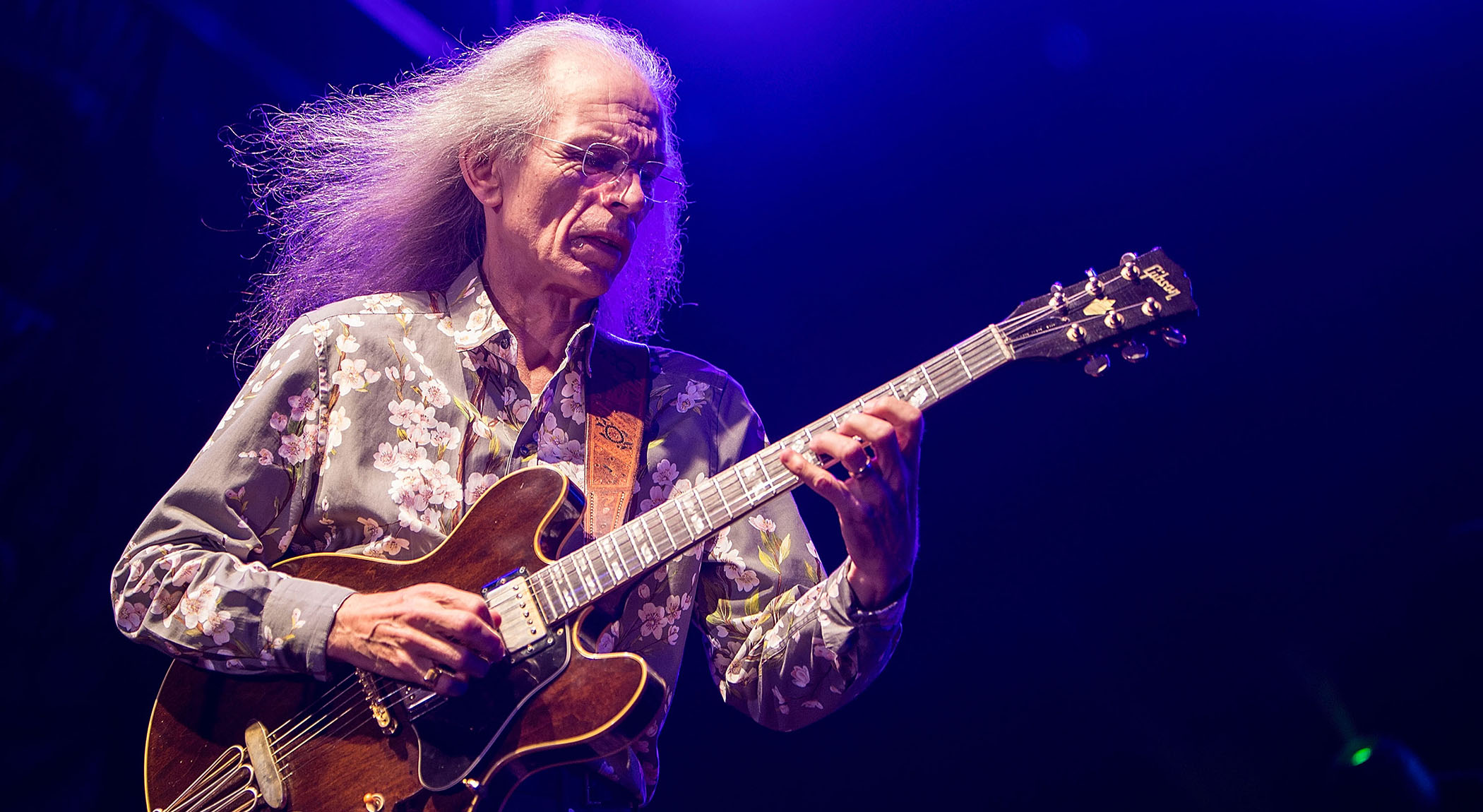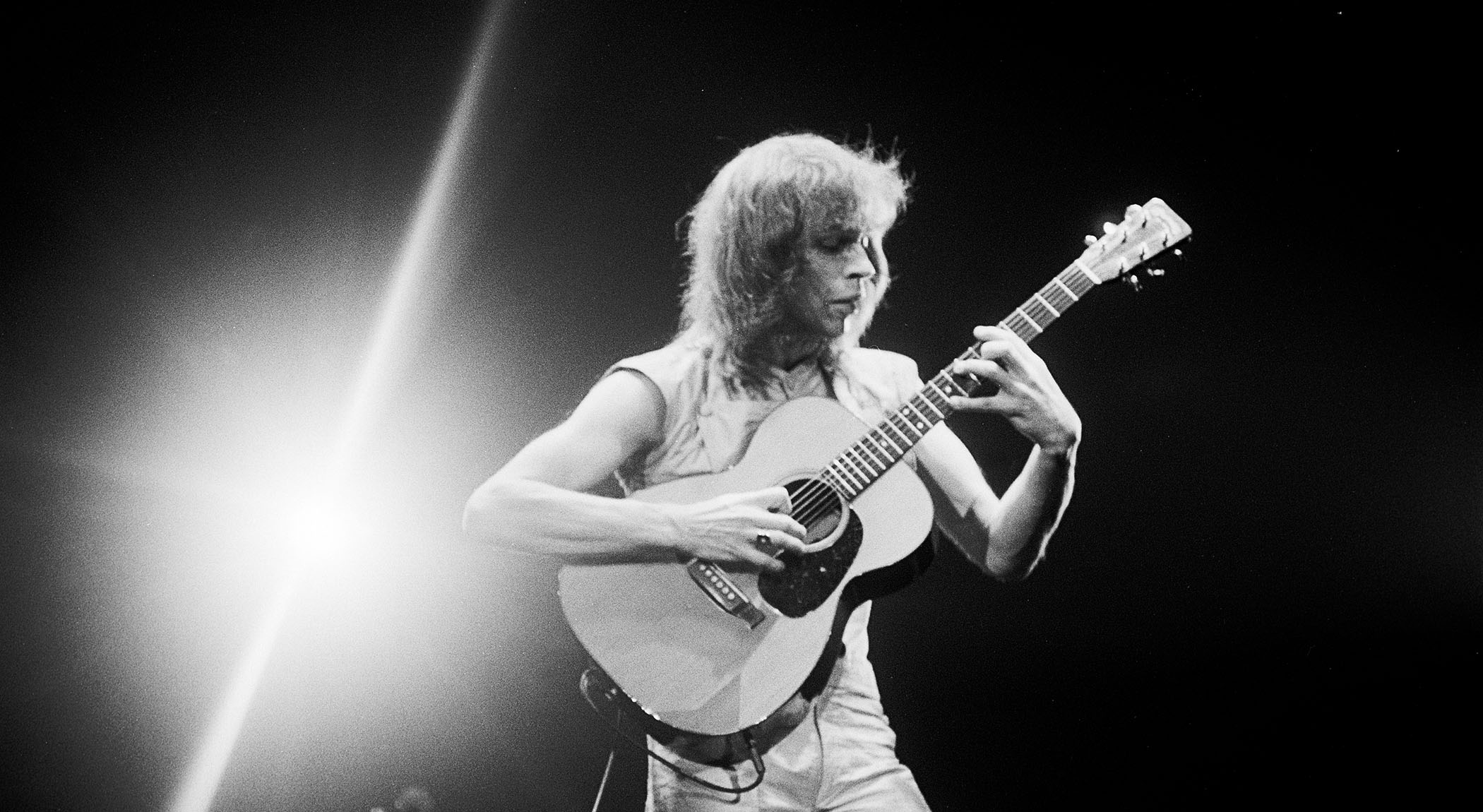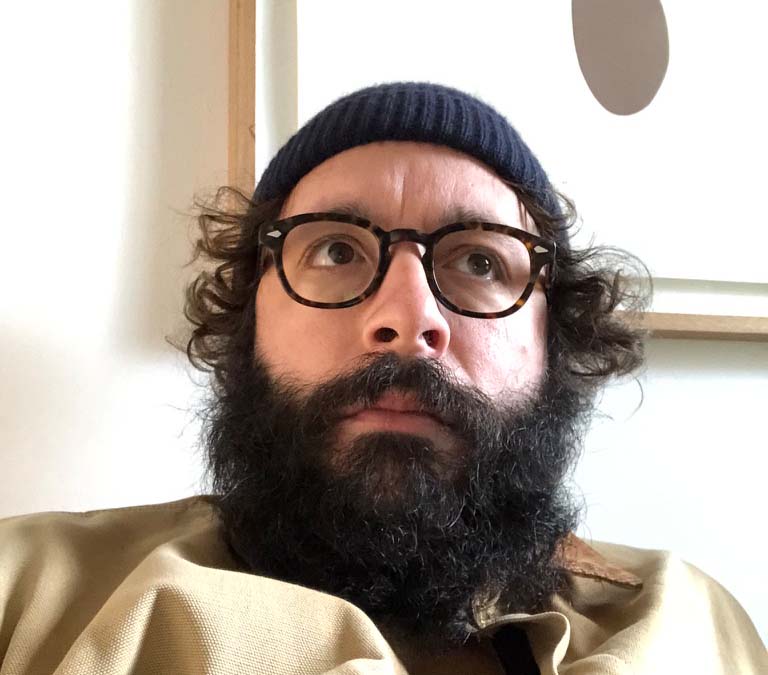“I don’t practice, because I don’t think that practicing in itself is necessary”: Yes icon Steve Howe on why he rarely runs scales, thrashing acoustics – and why you won’t catch him playing unfamiliar guitars
The prog legend checks in to talk all things guitar, from drawing inspiration from his parents' record collection and cutting his teeth on a cheap arch-top to finding his sound on the ES-175 and six-string explorations on Guitarscape

We have Steve Howe to thank for extending progressive rock’s boundaries beyond the horizon. The Yes guitarist’s jazz sensibility and musical curiosity shaped a sound that continues to evolve. His conceptual new solo album Guitarscape comprises a diverse array of chordal-driven guitar instrumentals, recorded with his son Dylan on drums.
What guitar did you learn on?
“I think it cost £14. I bought it in King’s Cross, London. It was just a brownish archtop kind of guitar, two f-holes and a bridge. Nothing fancy. It wasn’t a Framus but it was like that kind of guitar, and that was the first instrument that I owned. I was very grateful my Dad bought it for me. That was in 1959, and I really started in 1960.”
How much did you practice in the early days, and how much do you practice now?
“The answer is simple. I don’t practice, because I don’t think that practicing in itself is necessary unless I haven’t played for a long time and I want to do some warming up, then yeah, I might do some scales, and I have got an interesting kind of run-up thing that starts quite steady and then gets faster where you go through every note on the guitar.
“I love doing those but I don’t do them very often, and usually because I am in touch with my guitar. My hands have been playing for 60 years, so basically they do know where the frets are.
“Sometimes I like to play something I wrote to make sure I can still play it. I hadn’t played Clap [his instrumental track from 1971’s The Yes Album] for about two months, and I sat down and picked up a Martin and went, ‘Play Clap,’ and I played the whole thing! That is my confirmation, periodically, if I need it, because I don’t play it a lot.”
Get The Pick Newsletter
All the latest guitar news, interviews, lessons, reviews, deals and more, direct to your inbox!
Who was your biggest influence or what was your biggest motivation as a player?
“When I heard Chet Atkins, everything changed. I became more personalised in my ambitions, not just to become a guitarist but a particular kind of guitarist, free to do lots of things, not just Apache! Chet could manage nice things on just about anything, and also he had this marvellous back story of being associated with other great people.
“I didn’t know that at the time, and it took me a bit of time to realise that I had just read about him on the Everly Brothers records, in the liner notes [Atkins produced the Everly Brothers]. There was more to the man than you see. But playing was the central thing. He was brilliant, absolutely brilliant.”
“Initially, I didn’t realise how much two guitarists influenced me before I had even picked up the guitar, because I loved the sound they got. That was a guy called Jimmy Bryant, who played on the records my parents had, sung by Tennessee Ernie Ford, and of course Les Paul!
What is crucial now is that I’m playing guitars that I’m very familiar with. I won’t accept being unfamiliar with a guitar
“My parents had Les Paul records with Mary Ford, so I played those and I thought, ‘That’s pretty wonderful!’ They may have encouraged me towards the guitar. There was this interest in music in the house generally and I got into pop when it came out, Hank Marvin… guitar instrumentals.”
What are your non-negotiables when it comes to guitar?
“What is crucial now is that I’m playing guitars that I’m very familiar with. I won’t accept being unfamiliar with a guitar, and how it feels has become much more important. It has to feel absolutely right.
“I perform on performance-level guitars because I need that so much, and I won’t have a hindrance from the guitar. The guitars have to be very well maintained and well-strung, and Simon Thorn is doing that for me now. Simon’s doing great. The setup of the guitar is important.”
In terms of technique, what was the last new trick you learned?
“Most of what I think up has something new about it to me, although it maybe in the chords or something that I hear. I don’t know that I think about new tricks. There is a lot that you can do on a guitar that sounds really wonderful but is actually quite easy, so in a way, the guitar is a very tempting instrument to explore. Most players probably don’t stop finding nice things.”
In your early days, what guitar was the game-changer for you?
“My heart was set on a Gibson ES-175, in 1964, which my dad helped me buy. That is the most important guitar in the world to me, and that’s why it is heavily protected! I bought that only four years after starting the guitar, so it was very ambitious of me, but in that time, I’d had two other electric guitars; a Guyatone LG-40, sometimes called an Antoria LG-40, and also a Burns jazz guitar which had two pickups.”
What new instruments have you acquired recently?
“I got a new pedal steel by Williams and that is brilliant. That’s quite inspiring, too. Last year, I bought a Gibson Tennessean, which is once again a big wave to Chet Atkins because he designed this guitar, and he always sounded wonderful playing them. I mean, I had to get one, inevitably, and I find it wonderful, too. It is the featured guitar on a new track, Secret Mission.”
As a player, do you have any bad habits that you worry about?
“Well, the lightness of touch that Chet plays electric with – I’m getting there a little bit on the Tennessean, but I could play lighter. I would almost confess that when I hear the original Mood For A Day [his instrumental from another Yes album from 1971, Fragile], I think I am thrashing that guitar to pieces, and I don’t play like that at all anymore.
“So some of the things that I’ve done before I don’t do the same now, because I get more out of playing it beautifully and respectfully - and that goes for all of that area of performing it and making it right for the moment.”
Which is the song or performance that is you’re most proud of?
“It’s transient. It’s not the same. In one period, there will be something that grabbed you, but there can’t be an overriding song that I enjoy in that way. I would probably say Clap to be honest!
“Because that is only me and if I get it right then I am pretty happy. It’s good to have that pressure. I take it for granted that I can perform anything that I have recorded, but some things are easier than others.”

What do you play when you are relaxing and just playing for the fun of it?
“Basically, I don’t like to feel like there is any reason why I should play anything in particular. I do like to pull out a solo piece and play that, if it is the appropriate guitar to do that on. There might be something musically that I am thinking about, something I played last week. I’ve got my little voice recorder and I might check back.
“But I don’t need inspiration from outside. I just sit and play, but what I play… it might be improvised. I might just improvise. That’s what I replaced practising with. Just improvise.
“It doesn’t matter if you are playing chords or a single line, and you can hear the sort of music that you would hear background, imagining it was there, and jam if you like on a 12 bar. I think that’s the freedom I like – just to have fun.”
Is there a piece of music that you wish you could play but can’t?
“Loads of things! Thousands of things! I couldn’t even start there, but that’s what I do. I admire music. I admire other people’s music. When I hear Tal Farlow playing Chuckles or something, this is just sheer heavenly delightful jazz guitar – why would I even think I could do that? But there again, I have been influenced by jazz and it has a way of showing me that doesn’t require me going to the extent of specialising in it.”
A performer can really beat themselves up if they did something wrong that’s rather apparent or that is dreadful. You can spend days trying to forget it – just that one moment
And after all these years, is it still a challenge to play live?
“A performer can really beat themselves up if they did something wrong that’s rather apparent or that is dreadful. You can spend days trying to forget it – just that one moment. That happens often. It’s not never. That happens periodically with something you do; you come off and feel hurt.
“But you have to remember that this is live performance and you don’t know what’s going to happen when the show starts. All sorts of things can distract you. What we want to do is play the most electrifying shows that we can, but then again, we are not robots. We won’t be the same as the other show. I think that’s why most people come to shows – to see what happens.”
- Guitarscape is out now via Howesound.
Jonathan Horsley has been writing about guitars since 2005, playing them since 1990, and regularly contributes to publications including Guitar World, MusicRadar and Total Guitar. He uses Jazz III nylon picks, 10s during the week, 9s at the weekend, and shamefully still struggles with rhythm figure one of Van Halen’s Panama.
“I was in a frenzy about it being trapped and burnt up. I knew I'd never be able to replace it”: After being pulled from the wreckage of a car crash, John Sykes ran back to his burning vehicle to save his beloved '76 Les Paul
“His songs are timeless, you can’t tell if they were written in the 1400s or now”: Michael Hurley, guitarist and singer/songwriter known as the ‘Godfather of freak folk,’ dies at 83















